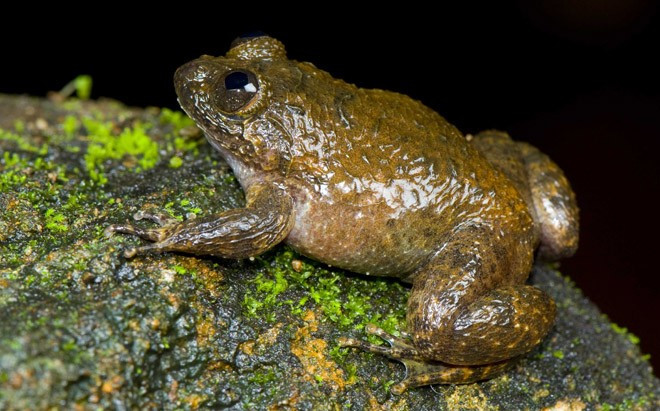Frogs thrived after catastrophic mass extinction that obliterated the dinosaurs
Scientists have come up with a new tree of life for frogs and a new timeline for their evolution.
The catastrophic mass extinction that wiped the dinosaurs off the face of the Earth set the stage for modern frog species to thrive, scientists have shown. Their findings suggest that this extinction 66 million years ago was crucial to shape the current wide diversity and geographic distribution of frogs seen on the planet.
Among the vertebrates that inhabit ponds and forests, frogs form part of a very large and diverse group. They comprise nearly 90% of all living amphibian species.
Biologists have long been fascinated by frogs' diverse biology and worldwide distribution, and thought that these little animals could help solve important evolution, ecology and conservation riddles.
However, to date, little is known about frogs' evolutionary history and about how fast they diversified due to sparse genetic data.
In a study now published in the Proceedings of the National Academy of Sciences, researchers present a new tree of life for frogs, clarifying the timeline for their evolution.
Frog genes
The international team of scientists sampled 95 genes of 156 frog species. They combined this data with previously published genetic data on an additional 145 species to produce the strongest-supported evolutionary tree of frogs to date. This method allowed them to come up with a robust hypothesis for how and when frogs evolved.
The scientists found that three major lineages of modern frogs - making up about 88% of them -appeared simultaneously, evolving right after the extinction event that marked the end of the Cretaceous Period and the beginning of the Paleogene 66 million years ago. This was the extinction event that led to the death of dinosaurs.

The results were surprising because past research had suggested a more ancient origin of many of these modern frog groups.
"Frogs have been around for well over 200 million years, but this study shows it wasn't until the extinction of the dinosaurs that we had this burst of frog diversity that resulted in the vast majority of frogs we see today. This finding was totally unexpected," said study co-author David Blackburn, associate curator of amphibians and reptiles at the Florida Museum of Natural History on the University of Florida campus.

Frogs appeared to diversify very quickly after the extinction event - which killed not only dinosaurs but also three quarters of all plants and animals on the planet. This suggests that the frogs that survived were probably filling up new niches on Earth. They emerged from this as one of the most diverse groups of vertebrates, with more than 6,700 known and described species to date.
"We think there were massive alterations of ecosystems at that time, including widespread destruction of forests. But frogs are pretty good at eking out a living in microhabitats, and as forests and tropical ecosystems rebounded, they quickly took advantage of those new ecological opportunities," Blackburn explained.
It's worth pointing out that despite many species of frogs survived the mass extinction event and thrived right after the age of dinosaurs, others did not make it. The extinction event was particularly hard on frog lineages in North America - most of the frogs seen today in this part of the world arose after the extinction.
"Except for a small handful of species, all other North American frogs are 'post-dinosaur' colonists," Blackburn said. "If you could travel back to the time of T. rex in North America, there would be frogs, but the chorus you would hear at night would have been nothing like you'd hear today. They're not even the same families."
The study could have implications to protect current endangered populations of frogs. "I think the most exciting thing about our study is that we show that frogs are such a strong animal group. They survived from the mass extinction that completely erased dinosaurs and boomed back quickly. However, frog species are declining nowadays because humans are destroying their habitats. Does that mean humans are making a huge extinction event even stronger than this one? We need to think about it", Peng Zhang, another study author, added.
© Copyright IBTimes 2025. All rights reserved.






















